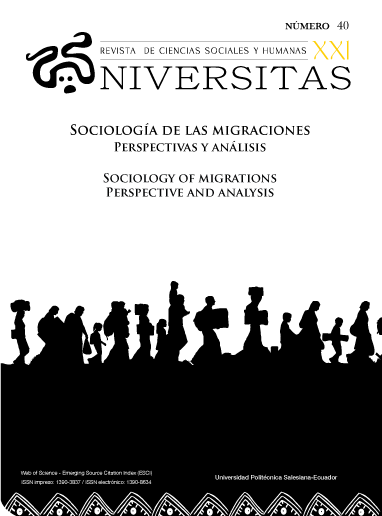From migrancy to “migrancia”: phenomenological approaches to the social process of the migration experience of the United States-Mexico migration camp
Main Article Content
Abstract
Article Details
Universitas-XXI Journal aligns with the principles of open access and academic collaboration by adopting the Creative Commons Attribution-NonCommercial-ShareAlike 4.0 International License (CC BY-NC-SA 4.0). This license ensures that published content can be used and shared widely under the following conditions:
Attribution: Authors and the journal must be appropriately credited as the original creators of the content, with full reference and a link to the publication provided.
Non-commercial use: Content may not be used for commercial purposes, preserving its academic and educational intent.
ShareAlike: Derivative works must be distributed under the same terms as this license, promoting the creation of accessible and equitable knowledge.
By implementing this license, the Universitas-XXI Journal strengthens its commitment to disseminating high-quality research, providing free access to knowledge, and fostering a collaborative environment among researchers, educators, and students worldwide.
This decision reflects core values of responsibility, ethics, and transparency in academia, ensuring that intellectual contributions serve as a foundation for new research and projects while respecting the rights of authors and the scientific community.
For more information about this license, please visit the following link: https://creativecommons.org/licenses/by-nc-sa/4.0/"
References
Ahmed, S. (2000). Strange encounters: Embodied others in post-coloniality. Routledge.
Ahmed, S. (2015). La política cultural de las emociones. Universidad Nacional Autónoma de México.
Arfuch, L. (2007). El espacio biográfico. Dilemas de la subjetividad contemporánea. Fondo de Cultura Económica.
Atkinson, P. (1997). Narrative Turn or Blind Alley? Qualitative Health Research, 7(3), 325-344. https://doi.org/10.1177/104973239700700302
Bajtín, M. (2000). Yo también soy: (fragmentos sobre el otro) (T. Bubnova, Trans.). Taurus.
Brah, A. (2005). Cartographies of diaspora: Contesting identities. Routledge.
Berger, P. L. y Luckmann, T. (2001). La construcción social de la realidad. Amorrortu.
Cairns, S. (ed.). (2003). Drifting-Architecture and Migrancy. Routledge.
Carter, P. (1992). Living in a new country. History, travelling and language. En I. Chambers (1994), Migrancy, culture, identity. Routledge.
Chambers, I. (1994). Migrancy, culture, identity. Routledge.
Chavez, L. R. (1992). Shadowed lives: undocumented immigrants in American society. Harcourt Brace Jovanovich College Publishers.
Dahinden, J. (2016). A plea for the de-migranticization of research on migration and integration. Ethnic and Racial Studies, 39(13), 2207-2225. https://doi.org/10.1080/01419870.2015.1124129
Ferguson, R. (1990). Introduction: invisible center. En Out there: marginalization and contemporary Cultures, 4. MIT Press.
de Fina, A. (2017). Narrative analysis. En The Routledge handbook of Language and Politics, 233-246. https://doi.org/10.4324/9781315183718-18
Deleuze, G. (1995). Negotiations, 1972-1990. Columbia University Press.
Dennett, D. (1991). Consciousness explained. Back Bay Books/Little, Brown and Company.
Dennett, D. (2003). Who's on first? Heterophenomenology explained. Journal of Consciousness Studies, 10(9-10), 19-30. https://bit.ly/46zHq7j
Dennett, D. C. (2007). Heterophenomenology reconsidered. Phenomenology and the Cognitive Sciences, 6(1), 247-270. https://doi.org/10.1007/s11097-006-9044-9
Derrida, J. (1998). Espectros de Marx: el estado de la deuda, el trabajo del duelo y la nueva internacional. Simancas Ediciones.
Drummond, J. J. (2006). Phenomenology: Neither auto- nor hetero- be. Phenomenology and the Cognitive Sciences, 6(1-2), 57-74. https://doi.org/10.1007/s11097-006-9037-8
Durkheim, E. (1997). Las reglas del método sociológico. Fondo de Cultura Económica.
Duvignaud, J. (2004). “Prefacio” de Halbwachs, M. (1925/2004). La memoria colectiva. Prensas de la Universidad de Zaragoza. pp. 7-15.
Føllesdal, D. (1991). El concepto de Lebenswelt en Husserl. Boletín de la Sociedad Española de Fenomenología, 4, 49-78.
Glick Schiller, N. y Salazar, N. B. (2013). Regimes of mobility across the globe. Journal of ethnic and migration studies, 39(2), 183-200. https://doi.org/10.1080/1369183X.2013.723253
Gómez, R. (2018). Ni aquí ni allá: Nociones de hogar y sentido de pertenencia en el contexto de la migración. Anuario Electrónico de Estudios en Comunicación Social “Disertaciones”, 11(1), 169-194. http://dx.doi.org/10.12804/revistas.urosario.edu.co/disertaciones/a.4897
Halbwachs, M. (1925/2004). La memoria colectiva. Prensas Universitarias de Zaragoza.
Halbwachs, M. (2004). Los marcos sociales de la memoria. Anthropos.
Handlin, O. (1973). The uprooted: The epic story of the great migrations that made the American people. University of Pennsylvania Press.
Haraway, D. (1988). Situated knowledges: The science question in feminism and the privilege of partial perspective. Feminist studies, 14(3), 575-599. https://doi.org/10.2307/3178066
Harney, N. D. y Baldassar, L. (2007). Tracking transnationalism: Migrancy and its futures. Journal of Ethnic and Migration Studies, 33(2), 189-198. https://doi.org/10.1080/13691830601154088
Harvey, D. (2000). Spaces of Hope. Edinburgh University Press.
Heidegger, M. (1925/1997). Ser y tiempo. Santiago de Chile, Editorial Universitaria.
Jacobs, J. M. (2002). Edge of empire: Postcolonialism and the city. Routledge. https://doi.org/10.4324/9780203430903
Jelin, E. (2012). Los trabajos de la memoria. Instituto de Estudios Peruanos.
Le Breton, D. (2006). El sabor del mundo. Una antropología de los sentidos. Nueva Visión.
Mayer, P. (1962). Migrancy and the study of africans in towns. American Anthropologist, 64(3), 576-592. https://doi.org/10.1525/aa.1962.64.3.02a00070
McCarthy, J. (2007). Dennett and Ricoeur on the narrative self. Humanity Books.
Merleau-Ponty, M. (1997). Fenomenología de la percepción. Planeta-Agostini.
Mignolo, W. (2010). Desobediencia Epistémica: Retorica de la Modernidad, Lógica de la Colonialidad y Gramática de la Descolonialidad. Ediciones del Signo.
Nare, L. (2013). Migrancy, gender and social class in domestic labour and social care in Italy: An intersectional analysis of demand. Journal of Ethnic and Migration Studies, 39(4), 601-623. https://doi.org/10.1080/1369183X.2013.745238
Nora, P. (2008). Pierre Nora en Les lieux de mémoire. Ediciones Trilce.
Thompson, D. L. (2000). Phenomenology and heterophenomenology: Husserl and Dennett on reality and science. En D. Ross, A. Brook y D. Thompson (eds.), Dennett's philosophy: a comprehensive assessment (pp. 201-218). MIT Press.
Traverso, E. (2011). El pasado, instrucciones de uso: historia, memoria política. Prometeo Libros.
Trigo, A. (2012). Sobre las diversas maneras del migrar/On the different ways of migrating. Revista Liminales. Escritos sobre Psicología y Sociedad, 1(01), 13-30. https://doi.org/10.54255/lim.vol1.num01.214
Sanford, V. (2006). Excavations of the heart: Reflections on Truth, Memory, and Structures of Understanding. En V. Sanford y A. Angel-Ajani (eds), Engaged Observer: Anthropology, Advocacy, and Activism (pp. 19-41). Rutgers University Press.
Schutz, A. (1982). Collected papers I. The problem of social reality. Martinus Nijhoff Publishers.
Smith, A. (2004). Migrancy, hybridity, and postcolonial literary studies. En N. Lazarus y L. Neil (eds.), The Cambridge companion to postcolonial literary studies (pp. 241-261). Cambridge University Press.
Vattimo, G. (1987). El fin de la modernidad. Gedisha.

